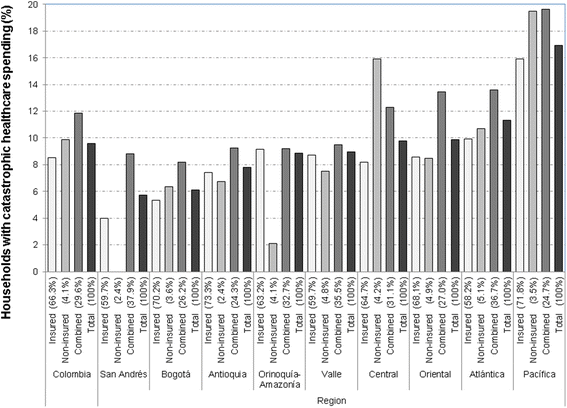Catastrophic expenditure due to out-of-pocket health payments and its determinants in Colombian households
- PMID: 27832821
- PMCID: PMC5105279
- DOI: 10.1186/s12939-016-0472-z
Catastrophic expenditure due to out-of-pocket health payments and its determinants in Colombian households
Abstract
Background: Out-of-pocket expenditure to pay for health services could result in financial catastrophe. The purpose of this study was to identify the incidence and determinants of catastrophic out-of-pocket payments for healthcare in Colombia. The underlying hypotheses are that low-income and non-insured population in Colombia, and households living in isolated and high level of rurality regions, are more likely to incur catastrophic healthcare expenses.
Methods: This study used data from the Quality of Life National Survey conducted in Colombia in 2011. The presence of catastrophic healthcare spending was calculated using the methodology proposed by the World Health Organization in 2005. Households were classified as having catastrophic health spending when their out-of-pocket health payments were over 20 % of their payment capacity. All other households were classified as not having catastrophic health spending. A probit model was estimated aimed at determining what factors influence the probability of catastrophic healthcare spending.
Results: Study findings show that 9.6 % of Colombian households had catastrophic expenditure. The incidence was higher in households in the Pacífica and Atlántica regions, extended and nuclear families, households with children or elderly adults, located in rural areas, and not insured under the healthcare system. The ratio of household members who work seems to reduce the risk of catastrophic healthcare spending, but the occurrence of any in-patient event increases it. So, there is no statistical evidence for rejecting the hypotheses under study.
Conclusions: Results indicate the importance of establishing intervention mechanisms in order to improve equity in access and payment for health care, protect vulnerable groups against financial risk, and, consequently, reduce the incidence of catastrophic healthcare spending. For this, it is essential to achieve universal health coverage through standardized and improved health services packages for vulnerable age groups and implement healthcare campaigns for households in rural areas where the incidence of out-of-pocket payments is higher.
Keywords: Catastrophic spending; Expense distribution; Health economy; Health insurance policy; Out-of-pocket expenditure.
Figures
Similar articles
-
Catastrophic healthcare expenditure and poverty related to out-of-pocket payments for healthcare in Bangladesh-an estimation of financial risk protection of universal health coverage.Health Policy Plan. 2017 Oct 1;32(8):1102-1110. doi: 10.1093/heapol/czx048. Health Policy Plan. 2017. PMID: 28575415
-
Determining factors of catastrophic health spending in Bogota, Colombia.Int J Health Care Finance Econ. 2011 Jun;11(2):83-100. doi: 10.1007/s10754-011-9089-3. Epub 2011 Feb 27. Int J Health Care Finance Econ. 2011. PMID: 21359837
-
Catastrophic healthcare expenditure and impoverishment in tropical deltas: evidence from the Mekong Delta region.Int J Equity Health. 2018 Apr 27;17(1):53. doi: 10.1186/s12939-018-0757-5. Int J Equity Health. 2018. PMID: 29703209 Free PMC article.
-
Economic Burden of Chronic Ill Health and Injuries for Households in Low- and Middle-Income Countries.In: Jamison DT, Gelband H, Horton S, Jha P, Laxminarayan R, Mock CN, Nugent R, editors. Disease Control Priorities: Improving Health and Reducing Poverty. 3rd edition. Washington (DC): The International Bank for Reconstruction and Development / The World Bank; 2017 Nov 27. Chapter 6. In: Jamison DT, Gelband H, Horton S, Jha P, Laxminarayan R, Mock CN, Nugent R, editors. Disease Control Priorities: Improving Health and Reducing Poverty. 3rd edition. Washington (DC): The International Bank for Reconstruction and Development / The World Bank; 2017 Nov 27. Chapter 6. PMID: 30212160 Free Books & Documents. Review.
-
Evaluating the impact of the national health insurance scheme of Ghana on out of pocket expenditures: a systematic review.BMC Health Serv Res. 2018 Jun 7;18(1):426. doi: 10.1186/s12913-018-3249-9. BMC Health Serv Res. 2018. PMID: 29879978 Free PMC article.
Cited by
-
Disparities in healthcare-seeking behaviors and associated costs between Venezuelan migrants and Colombians residing in Colombia.Int J Equity Health. 2024 Oct 7;23(1):202. doi: 10.1186/s12939-024-02289-y. Int J Equity Health. 2024. PMID: 39375754 Free PMC article.
-
Unmet Healthcare Needs, Catastrophic Health Expenditure, and Health in South Korea's Universal Healthcare System: Progression Towards Improving Equity by NHI Type and Income Level.Healthcare (Basel). 2020 Oct 16;8(4):408. doi: 10.3390/healthcare8040408. Healthcare (Basel). 2020. PMID: 33081357 Free PMC article.
-
COVID-19 and the gendered markets of people and products: explaining inequalities in infections and deaths.Rev Can Etudes Dev. 2021;42:37-54. doi: 10.1080/02255189.2020.1824894. Epub 2020 Oct 23. Rev Can Etudes Dev. 2021. PMID: 35475122 Free PMC article.
-
Has the free maternal health policy eliminated out of pocket payments for maternal health services? Views of women, health providers and insurance managers in Northern Ghana.PLoS One. 2018 Feb 1;13(2):e0184830. doi: 10.1371/journal.pone.0184830. eCollection 2018. PLoS One. 2018. PMID: 29389995 Free PMC article.
-
Universal Pharmacare in Canada: A Prescription for Equity in Healthcare.Int J Health Policy Manag. 2020 Mar 1;9(3):91-95. doi: 10.15171/ijhpm.2019.93. Int J Health Policy Manag. 2020. PMID: 32202091 Free PMC article.
References
-
- Inter-American Development Bank. Colombia, Expansion of the program for the reorganization, redesign and modernization of health service networks. PIC, CO-L1017: Loan Proposal; 2006.
-
- Bottia M, Cardona-Sosa L, Medina C. El SISBEN como mecanismo de focalización individual del régimen subsidiado en salud en Colombia: ventajas y limitaciones. Revista de Economía del Rosario. 2012;15(2):137–177.
-
- Ministerio de la Protección Social. Sistema de Seguridad Social en Salud, Régimen Contributivo. Imprenta Nacional de Colombia; 2004. https://www.minsalud.gov.co/Documentos%20y%20Publicaciones/GUIA%20INFORM...https://www.minsalud.gov.co/Documentos%20y%20Publicaciones/GUIA%20INFORM...
MeSH terms
LinkOut - more resources
Full Text Sources
Other Literature Sources
Medical


